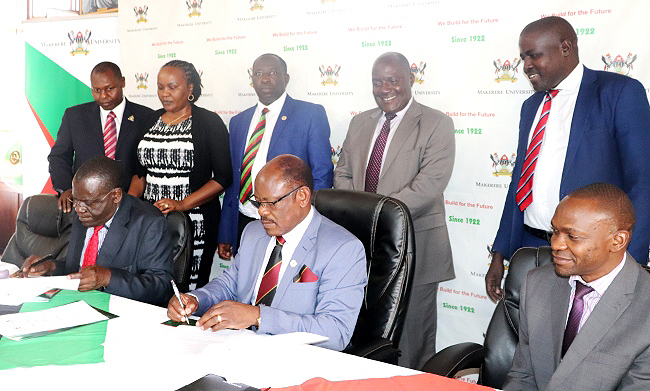Makerere University and Mount Kenya University (MKU) on Monday, 14th January 2019 officially expanded their collaboration to institutional level following the signing of a Memorandum of Understanding (MoU). Signed on behalf of Mak by the Vice Chancellor, Prof. Barnabas Nawangwe and on behalf of MKU by the Vice Chancellor, Prof. Stanley Waudo, the MoU is a follow-up of an earlier one signed on 19th September 2017 between the two institutions’ Colleges of Health Sciences. Mak’s College of Education and External Studies (CEES) has also been collaborating with MKU’s School of Education since 2017.
Welcoming the delegation to Makerere University, Prof. Barnabas Nawangwe commended MKU and colleagues in Makerere for all the progress made since the initial agreement was signed at college level.
“Collaboration is the way to go. We should emulate Universities in the US and Europe which are reaping a lot from grants through joint applications. I therefore encourage all colleagues engaged in partnerships with Mount Kenya University to jointly apply for grants. This way, we shall be able to attract bigger funding for our research activities” remarked Prof. Nawangwe.
Accompanied by his Deputy Vice Chancellor, Academic and Research Affairs, Dr. Bibianne Waiganjo and Director of Quality Assurance, Linkages and Partnerships, Prof. Mwangi Peter Wanderi, Prof. Waudo further emphasised the need for both institutions to focus on graduate students if they are to improve their research output.
“As Professors, we are training these students to take over from us. We should teach them how to write research grants” said Prof. Waudo in reference to his own training at Iowa State University where he earned his Masters and PhD in plant pathology. “At Masters level, first year students are paired with colleagues in second year for mentorship and review of theses so that professors receive a refined document. The is the same case at PhD level” he added.

Contributing to the day’s discussion, the Acting Director, Gender Mainstreaming Directorate (GMD), Dr. Euzobia Mugisha Baine reiterated Makerere’s regional leadership in institutionalising gender in University functions. In 2001, the Gender Mainstreaming Programme was initiated under the Department of the Academic Registrar and has in the last ten years transitioned from the Gender Mainstreaming Division to the Gender Mainstreaming Directorate.
“It is good to learn that Mount Kenya University has adopted a Gender policy. However, from our experience, you need to develop and implementation framework in order to effectively implement the policy” advised Dr. Mugisha.
In his remarks, the Director, Directorate Research and Graduate Training (DRGT), Prof. Buyinza Mukadasi shared with the visiting delegation Makerere’s current drive to be a research-intensive university.
“The Directorate of Research and Graduate Training coordinates the institution research efforts at college and project levels. We are reaping big from international collaborations with each of the ten colleges and Principal Investigators (PIs) attracting research grants for the various projects” remarked Prof. Buyinza.
He further shared the University’s drive to improve graduate training as a way of boosting research output. “Our biggest pillar in research is graduate students. We are implementing the Doctoral Committee system to improve our throughput and hold annual Doctoral Conventions for accountability and to share progress on various research findings.”
The Principal, College of Education and External Studies (CEES), Prof. Fred Masagazi Masaazi was all praises for the Mak-MKU collaboration which has played witness to joint supervision of education students on school practice by staff from both institutions.

“At the end of the visits, we generate reports which have been very good in informing us on the way forward. We are now jointly developing multidisciplinary research projects” added the Principal.
The College of Health Sciences (CHS) has since signing the MoU in September 2017 made several strides in joint research projects. The Principal CHS, Prof. Charles Ibingira shared that the two institutions were utilising the US$100,000 joint research grant forge South-South research partnerships.
“We have a model where applicants from the two institutions must pair up in order to apply for grants and Prof. Harriet Mayanja-Kizza is in charge of this. So far, we have over five teams working together that have already embarked on research. We shall soon produce joint publications” remarked Prof. Ibingira.
“Collaboration is a great endeavour that all contemporary universities should look forward to” remarked the Deputy Vice Chancellor (Academic Affairs), Dr. Umar Kakumba as he gave the concluding remarks.
“Makerere has invested heavily in staff development and I can assure you that collaboration with this University in terms of staff exchange cannot lack in any discipline. We have approximately 800 staff with PhDs in various disciplines” said Dr. Kakumba.
He however pointed out that whereas staff exchange was thriving, student exchange was still lacking and needed to be promoted. “Our proximity to each other will grant new learning experiences to our students and give them good exposure to our different learning environments” added the DVCAA.
Earlier, Prof. Mwangi had made a presentation on MKU during which he shared his institution’s intention to benchmark Mak’s College of Veterinary Medicine, Animal Resources and Bio-security (CoVAB). He also highlighted cost-cutting measures undertaken by MKU and CEES that involved teams meeting at the border town of Busia for one week in order to undertake joint activities, instead of travelling all the way to either institution’s campuses.
The two parties thereafter signed the MoU and exchanged institutional souvenir items. The MKU will during their visit to Makerere University tour the Main Library, visit the CHS Campus in Mulago and attend the 69th Graduation Ceremony.
Article by Public Relations Office

 Humanities & Social Sciences7 days ago
Humanities & Social Sciences7 days ago
 General6 days ago
General6 days ago
 Health2 weeks ago
Health2 weeks ago
 Agriculture & Environment1 week ago
Agriculture & Environment1 week ago
 General2 weeks ago
General2 weeks ago






